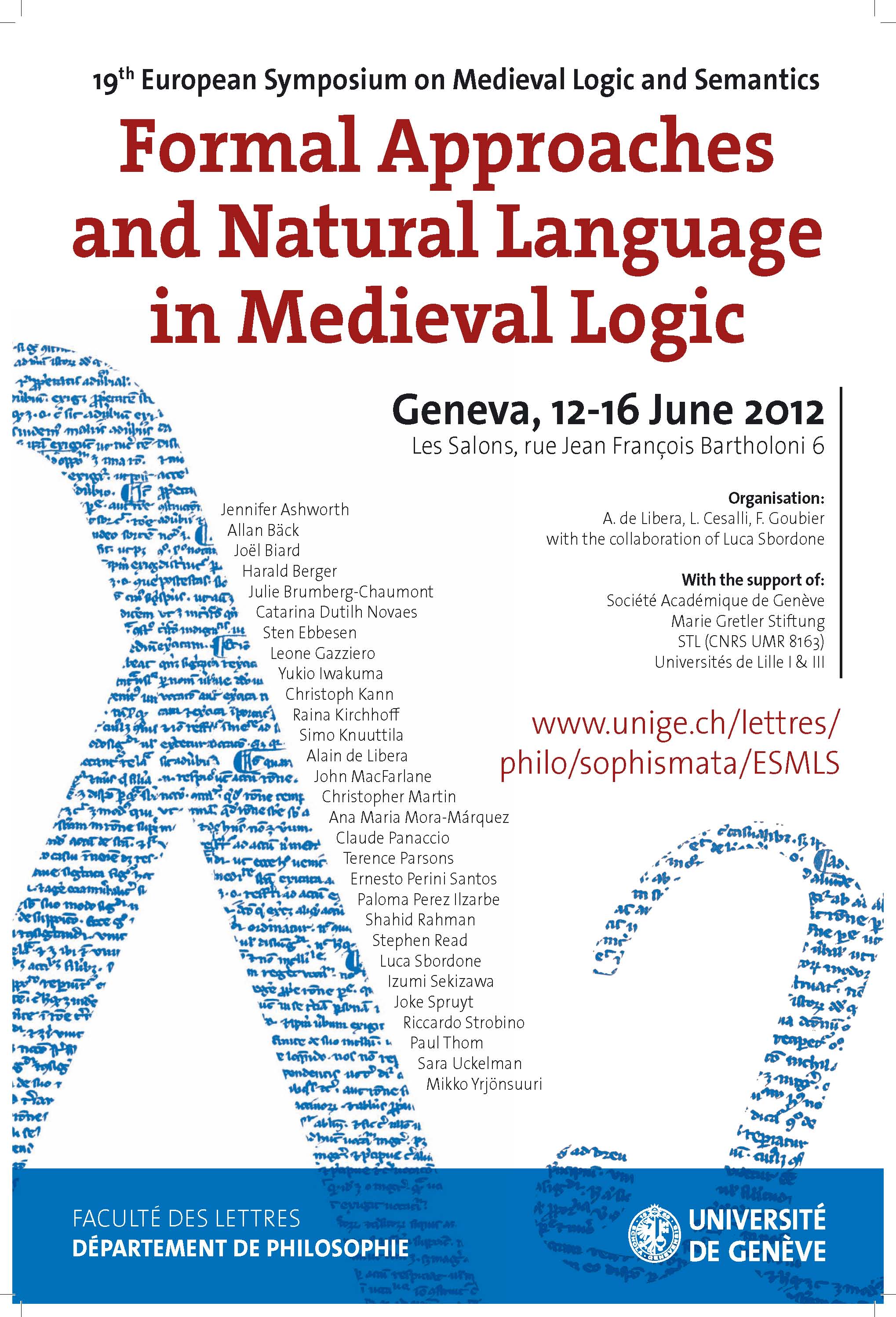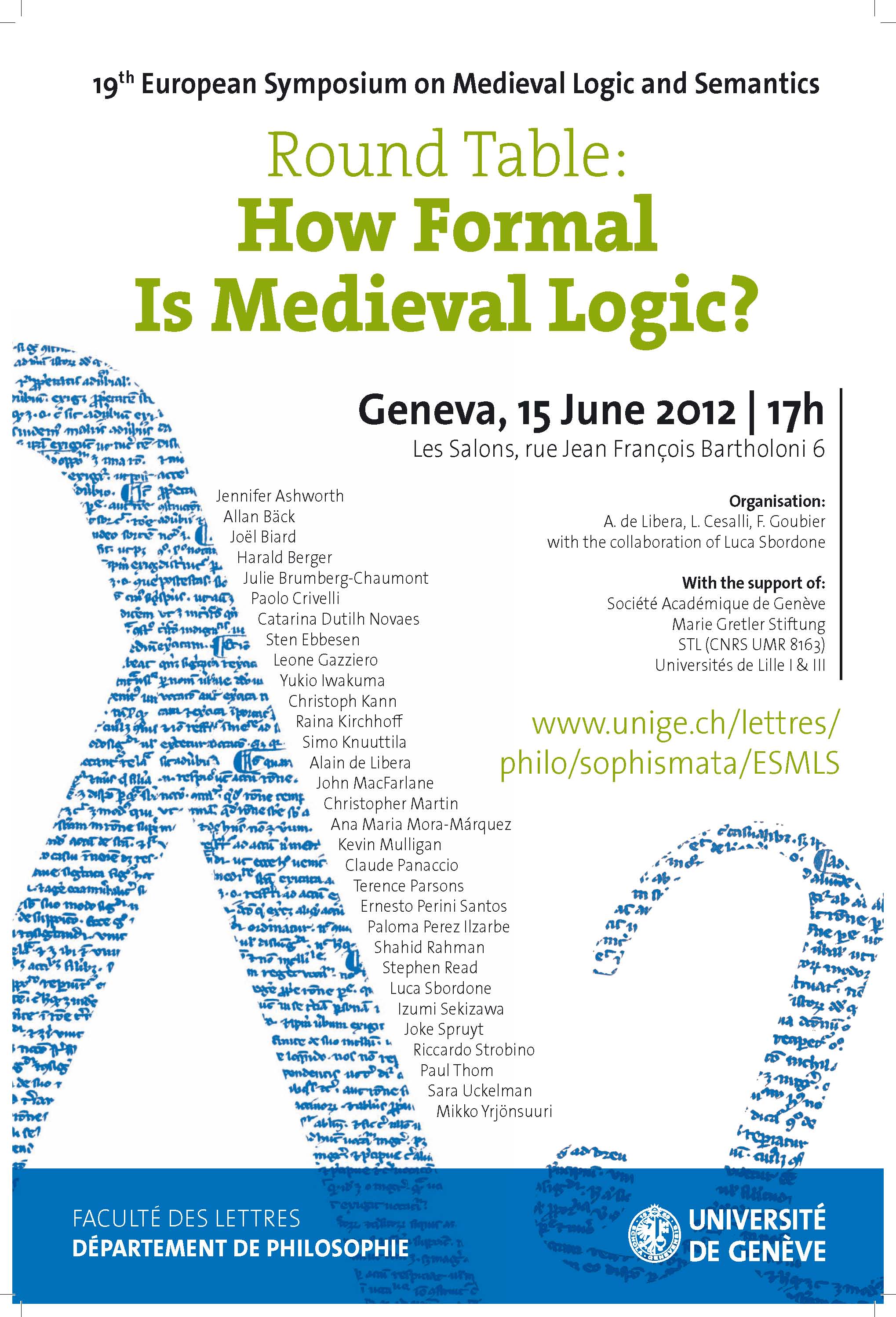Formal Approaches and Natural Language in Medieval logic
XIXth European Symposium on Medieval Logic and Semantics
Geneva, 12-16 June 2012, Théâtre « Les Salons », rue Jean François Bartholoni, 6
Programme
Tuesday 12 June
10:00-10:15 Alain de Libera (Université de Genève – EPHE, Paris): Opening of the symposium
I. Formal Semantics: Medieval and Contemporary Issues and Strategies
10:15-11:00 Terence Parsons (University of California, Los Angeles): “There is no fundamental difference between medieval logic and contemporary (philosophical) logic”
11:30-12:15 Leone Gazziero (Université de Genève): “Utrum figura dictionis sit fallacia in dictione. Et quod non videtur. How Medieval Logicians Came to Account for an Odd Question by an Impossible Answer”
13:45-14:30 Ana Maria Morá-Marquez (Københavns Universitet): “13th Century Masters of Arts on Equivocation”
14:30-15:15 Harald Berger (Universität Graz): “Sortes differt ab omni homine: A Tension in Albert of Saxony’s Concept of Merely Confused Supposition”
15:45-16:30 Luca Sbordone (Scuola Normale Superiore, Pisa): “Semantics and Pragmatics of Reference. Elements of a contemporary theory of supposition”
II. Medieval Semantics of Natural or Ideal Language?
Wednesday 13 June
09:00-09:45 Allan Bäck (Kutztown University): “Aristotelian Protocol Languages”
09:45-10:30 Raina Kirchhoff (Universität Düsseldorf) / Christoph Kann (Universität Düsseldorf): “Formal elements in natural language – Sherwood's Syncategoremata”
11:00-11:45 Claude Panaccio (Université du Québec à Montréal): “Ockham on Synonymy and Mental Language”
11:45-12:30 Ernesto Perini Santos (Universidade Federal de Minas Gerais): “The underdetermination of the structure of mental language in Ockham and Buridan”
14:00-14:45 Joël Biard (Université de Tours): “Le langage ordinaire de Jean Buridan”14:45-15:30 Stephen Read (University of St Andrews): “Non-Normal Propositions in Buridan’s Logic revisited”
16:00-16:45 Jennifer Ashworth (University of Waterloo): “How Natural is Natural Language? Some Post-medieval Discussions”16:45-17:30 Irène Rosier-Catach (CNRS-EPHE, Paris) "Logique et théologie à Port Royal: le sens "ordinaire" et "catholique" de "hoc est corpus meum"”
III. Medieval Formal Logic – Hylomorphism and Formal Validity
Thursday 14 June
14:00-14:45 Yukio Iwakuma (Fukui Prefectural University): “On Medium, a type of argumentation in the early 12th century”
14:45-15:30 John MacFarlane (University of Berkeley): “The Origins of Logical Hylomorphism”
16:00-16:45 Christopher Martin (University of Auckland): “Abelard’s Notion of Formality”
16:45-17:30 Julie Brumberg-Chaumont (CNRS, Paris): “Forme et matière dans l'analyse des raisonnements sophistiques”
Friday 15 June
09:00-09:45 Catarina Dutilh Novaes (Rijksuniversiteit Groningen): “The Form of a Syllogism – Figure or Mood?”
09:45-10:30 Paul Thom (University of Sydney): “Kilwardby on Form and Matter”
11:00-11:45 Sara Uckelman (University of Amsterdam): “Speech Acts, Propositional Attitudes, and Commitments in Formal Dialogues”
11:45-12:30 Joke Spruyt (Universiteit Maastricht): “Form and Focus”
14:00-14:45 Riccardo Strobino (Scuola Normale Superiore di Pisa): “Truth and Consequence in Peter of Mantua”
14:45-15:30 Mikko Yrjönsuuri (Jyväskylän Yiliopisto): “Consequentia formaliter formalis in Paul of Venice and other kinds of formal validity”
16:00-16:45 Paloma Perez-Ilzarbe (Universidad de Navarra): “Syllogism as a formal consequence: some problems concerning expository syllogisms”
17:15-18:45 Round Table: How Formal is Medieval Logic?


